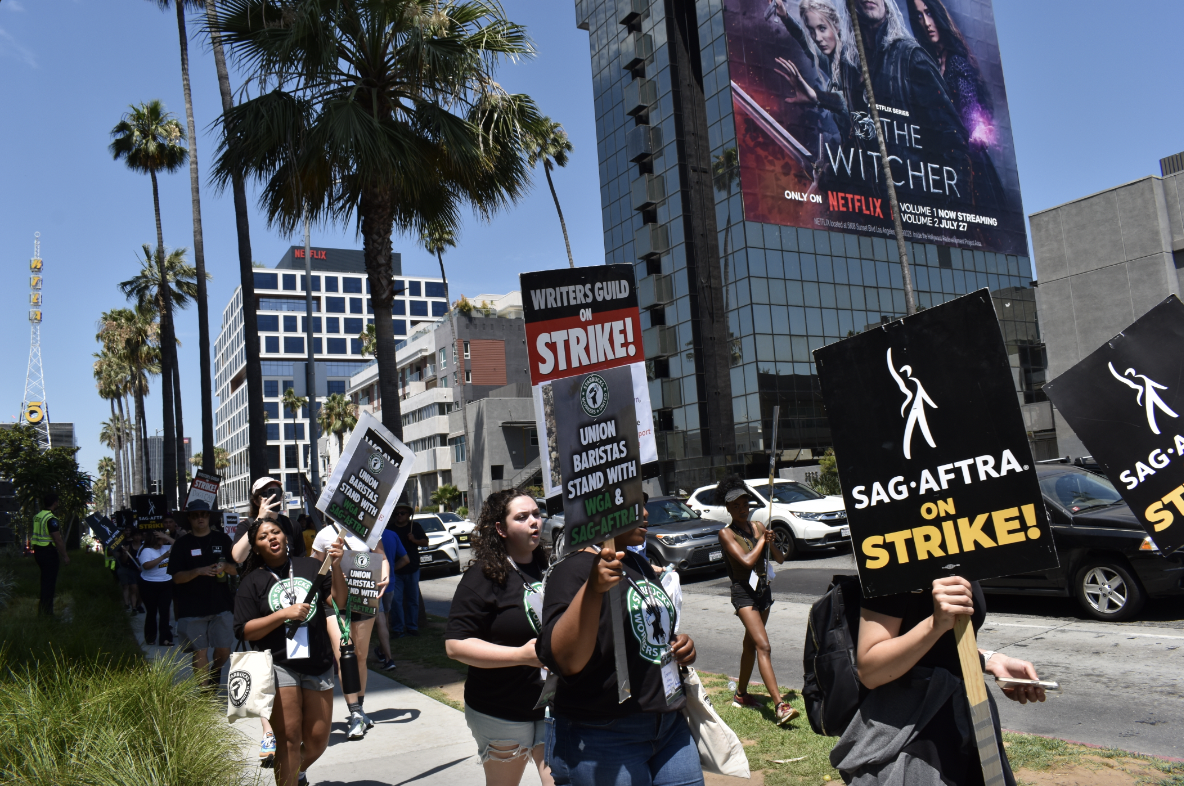Recently, technological advancements in artificial intelligence (AI) have spread unease within Hollywood and the film industry. This past summer, the Writers Guild of America (WGA), Screen Actors Guild (SAG), and the American Federation of Television and Radio Artists (AFTRA) brought to light concerns about the impact of AI upon their their jobs in a set of strikes, showing the growing effects of technology on every aspect of American life.
On May 2, 2023, the WGA launched a writer’s strike against the Alliance of Motion Picture and Television Producers (AMPTP), condemning the use of artificial intelligence to write content, instead of paid employees.
Junior Robert Morgan, a member of Southern Lehigh’s theater program since his freshman year (who will play the part of Mal in the upcoming production of The Addams Family), feels uneasy with what this could mean for the film industry’s future.
“I think AI is a tool that can be sometimes used for good things. But ultimately, when it comes down to it, we should let the people who are paid to write, write,” he said. “Otherwise it won’t be authentic, and you’re just taking jobs from people who’ve worked hard for them.”
On July 14, 2023, the union leaders of the SAG-AFTRA organizations voted to strike against studios for similar reasons, including the competition artificial intelligence brings for actors. Additionally, the unions spoke out against decreased pay due to the boom of streaming services, such as Hulu or Netflix. Actors and writers are experiencing major decreases in their earnings, as most profit from streaming funneled directly to company executives.
For both unions, the decision to strike was not taken lightly. The WGA union went on their first strike since 2008, and the SAG-AFTRA unions went on their first dual strike in more than sixty years.
The boom of artificial intelligence created widespread unease among writers and actors who feared that corporations could use their faces, voices, or likenesses without providing any payment or asking for consent. Writers fear that their jobs will be overtaken by AI, with computers, as opposed to real people, writing film and television scripts. Actors worry they could be replaced altogether by computer-generated AI images and voices.
Not only would this take jobs, but some consumers, including senior Olivia Terefenko, feel AI would impair a film’s quality.
“If I knew that a movie coming out was fully AI-generated, I don’t think I would be able to go watch it. There’s no real people, it’s all just computers,” she said. “It wouldn’t have the same effect emotionally on me if I knew the actors weren’t real. Would a computer even be able to portray their feelings well?”
Senior theater student Tori Davis, who played Sherrie in Southern Lehigh’s last spring production of Rock of Ages, and will play Alice in The Addams Family this spring, worries about the loss of human dimension.
“I don’t think I would be able to play a role in a production that I knew was written by AI,” she said. “I think it would feel so artificial [and] create a barrier for me when trying to connect with the characters. I want human ideas to work with, not just something computer generated.”
These strikes caused major consequences for Hollywood and the film and television industry. Actors and writers participating in the strike refused to participate in any new film projects or promote current or past projects. Under the terms of the strike, actors and actresses were not even allowed to directly mention their films on social media. This resulted in many projects lacking media coverage and publicity.
During the writer’s strike, the WGA drafted a new contract with higher demands and protections against the growing technology and decreased pay. Their new contract required the mandatory staffing of writing rooms, higher royalties for their works, and protection against potential replacement or replication by the use of artificial intelligence. The WGA was successful after many months of the strike, and a new contract went into effect on September 27, 2023.
The final details of the contract included most of the demands: increased minimum pay rates, improved health care benefits, expanded streaming payments, and a longer minimum period of work for writers. Artificial intelligence can no longer be used as a replacement for a writer’s work and credit. Companies are further required to inform writers of all AI-generated material within projects they are part of, and the WGA has the right to approve or declare whether or not that material is unlawful and against their contract.
Actors and actresses experienced a similar outcome from the SAG-AFTRA strikes. A new three-year contract was approved by vote on November 9, 2023. The contract included protection for actors against artificial intelligence use, similar to the writers’ demands.
Studios must gain actor consent before creating artificially generated images of them within their projects, and actors must be paid as if they themselves are acting out the AI-generated role. A new fund was created to pay performers victimized by streaming services, allowing actors to be paid post-production when movies and television shows move onto streaming services. Among other demands, a general wage increase was also approved for background and leading actors, further protecting actors’ rights within the streaming services.


